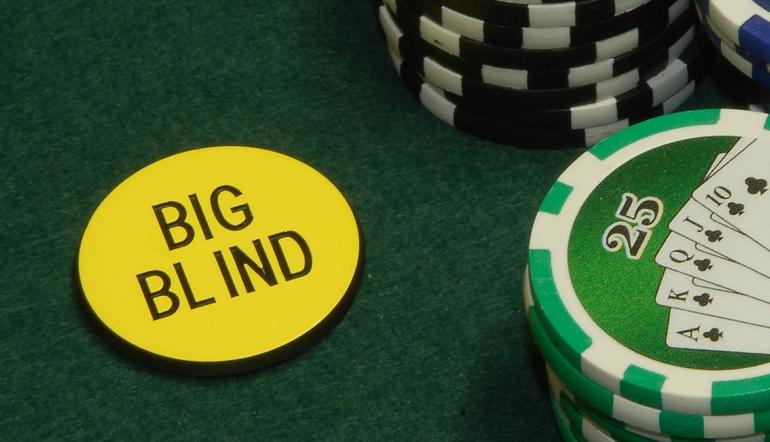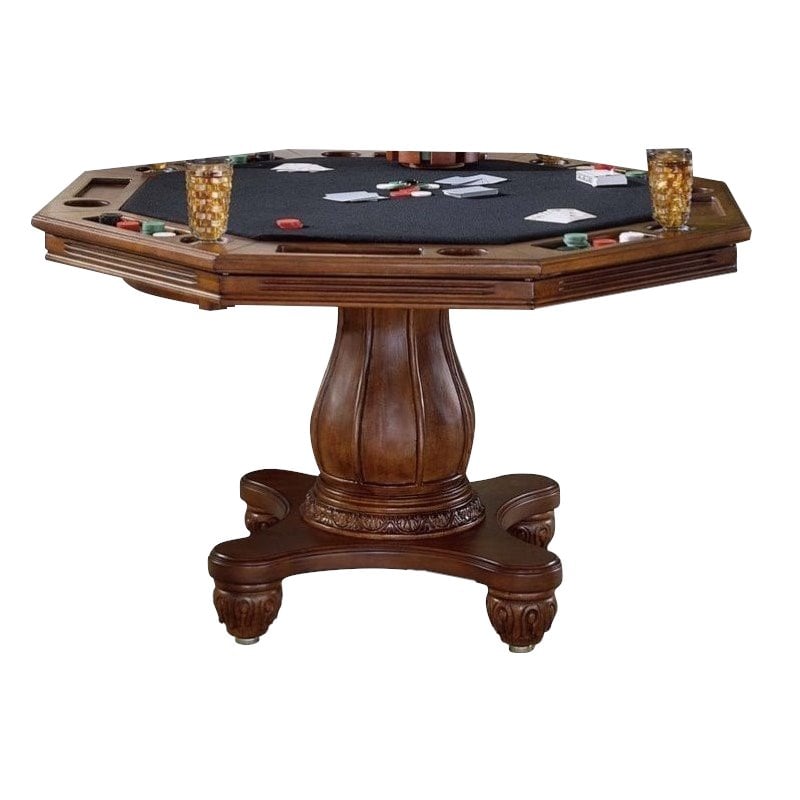Poker Blinds

Poker Blinds Explained
A typical T10,000 blinds schedule for a No-limit Texas Hold'em poker tournament is shown to the right. T10,000 means that each player is issued 10,000 chips at the start of the tourney. This blinds schedule starts out slow for the first hour and should result in a poker tournament of about 4 hours.
In poker games with blinds, chopping the blinds is a custom that may occur when all other players fold to the blinds before the flop. The blinds then remove their bets, ending the hand.
Chopping the blinds is a common occurrence in live ring games, whereas it is not allowed in tournament play (the small blind must raise, call or fold and cannot reclaim their bet), and is seldom, if ever, possible in play on the internet.
Why players chop[edit]
Players generally chop for one of two reasons.
- Many players do not enjoy playing heads-up, and would rather play multi-way pots, so if the first few players at a table fold rather than calling the big blind, the entire table may fold. In this case, chopping is more of a social custom.
- Chopping allows the blinds to avoid paying the rake for a hand that is unlikely to develop into a large pot. In this case, chopping is more of an economic decision.

In higher limit games, players tend to be tighter, and it is more common for everyone to fold to the blinds. In this case, chopping would occur so frequently that it would be pointless. Furthermore, higher limit games are much more likely to be short-handed. Finally, the rake in higher limit games is usually much smaller in comparison to the size of the pot, and if a collection is taken instead of a rake, this removes the economic reason for chopping. For all these reasons, chopping is much more common in lower limit games than in higher limit games.
In order to start betting in Hold’em, forced bets (known as blinds) are made by the two players immediately clockwise from the dealer button. The person immediately clockwise from the dealer has the small blind, and the next player clockwise has the big blind. Making blind bets is known as posting and this is done before any cards are dealt. In poker games with blinds, chopping the blinds is a custom that may occur when all other players fold to the blinds before the flop. The blinds then remove their bets, ending the hand. The blinds then remove their bets, ending the hand.
Ethics of chopping[edit]
While chopping is a very common practice, some players feel it is antithetical to the nature of poker, especially in short-handed games. Mason Malmuth gives the following reasons why he believes chopping damages a poker game:
- Chopping creates the illusion of partnerships.
- Chopping takes the killer instinct out of the game.
- Chopping allows a tight player to play ante-free.
- Chopping creates confusion and hard feelings.
- Chopping ruins short-handed games.
Many of these reasons overlap. For example, players who know each other tend to chop more often. This sometimes encourages these players to chop on future betting rounds, when everyone else has left the pot. This can be very confusing for other players, as it can give the illusion of partnership and collusion, even if such collusion is unintended.
General etiquette[edit]
There are some general guidelines that have developed in regard to chopping the blinds, which are as follows:
- The decision whether to chop or not should be made prior to the hand being dealt. Specifically, the decision to chop should not be based on the strength of one's cards. Otherwise, players would only chop their weak blind hands when it comes around to them.
- Generally, a player should adhere to a consistent chopping policy for each game they play. For example, a common chopping policy which many players adopt for community card games such as Texas hold 'em is to always chop if there are at least 6 players dealt in, and to never chop if there are fewer than 6 players dealt in. Another common policy is simply never to chop at all.
The important point is that a player's chopping policy should be made public and should be consistent whenever they play. If a player decides to deviate from his or her usual chopping policy for a single hand or a single session, this should be publicly announced. Players who constantly change their chopping policy from session to session, or worse, from hand to hand, in order to secure an advantage, are generally considered to be engaging in unethical behaviour.
References[edit]
- Malmuth, Mason, Poker Essays, Volume II, Two Plus Two Publishing, ISBN1-880685-15-9

When you are in the casino at the beginning of a poker game, and you have lots of chips, the blinds are something you hardly notice. Towards the end of a poker night, especially if things aren’t going so well and your chip pile is lower than you’d like it to be, or the blind bets are increasing in size, then the blind can really eat into your stack.
Some poker games have antes – forced bets. But Texas Holdem doesn’t, meaning you can fold your cards without betting. Texas Holdem poker does have something called blinds though. They are another type of forced bet, but this time before you have been dealt your cards. Like antes, they exist so that there is a cost to playing, so the poker games don’t go on and on with players just waiting to be dealt a great hand. Paul Phua thinks that the blind keeps the momentum up, and ensures the game of poker finishes within a reasonable time frame – especially since the blinds often increase in value during a game of Texas Holdem to speed things up even further.

Poker Blinds Structure
There are mainly two blinds in Texas Holdem – the big and small blind, but there can sometimes be three players who have to make them.
Poker Blinds
The name comes from the fact that players are being asked to bet without seeing their hands. They are betting blind, with no knowledge of the hand’s worth. So in the casino, whether you hold a 2 and a 3 unsuited, or a pair of aces – before you see your hand it’s all the same.
Paul Phua says the blind also marks potential poker strategy. Depending on your position around the poker table in a casino, or a social poker night where the dealer changes as the “button” moves from player to player, you will have to give certain blinds. Being in the small blind spot on a poker table is a disadvantage because you will be the first to act in every round after the flop. But Paul Phua’s poker tip is to remember never feel committed to a pot simply because you have paid your blind, especially in Texas Holdem, and not be afraid to enter a pot if you have a strong enough hand.